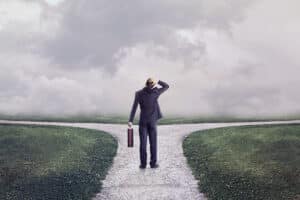 In our culture, it’s significantly more desirable and respectable to know vs. not know about something. Our society has continually supported the importance of knowing what we’re talking about — there’s little room for uncertainty and not-knowing.
In our culture, it’s significantly more desirable and respectable to know vs. not know about something. Our society has continually supported the importance of knowing what we’re talking about — there’s little room for uncertainty and not-knowing.
As we explore this prejudice, it will become more obvious that the more we stay on the superficial life issues, the easier it is to remain in a knowing state. However, the deeper we penetrate issues like intimacy in relationships, having a sense of purpose, spiritual questions, deeper psychological inquiry, or dealing with life and death issues, the more not-knowing arises naturally.
It is easy to say you know more about something when we stay on surface issues and if our goal is to be more normal by staying within a safe ground. However, the critical issue is that not-knowing is the best starting point as we delve into the issues that matter most in life, and most of us have been taught how to revere this state deeply.
The first step is to recognize and acknowledge the not-knowing
Across 50 years of counseling, I doubt there has been a session where there weren’t elements of not-knowing that were brought up and gone into. I’ve said that not-knowing is the perfect starting point (and beyond) and virtually never the ending point for encouraging contemplation and conversation thousands of times.
We all need to greet this with honor and see it for what it is — a sign of depth, courage, and humility, especially if we don’t run away from it. But, unfortunately, the reflex for most of us, especially when this perspective is not made conscious, is to feel critical of the not-knowing with feelings of embarrassment, inadequacy, and a desire to change the subject.
Given that it is the entry point to virtually all of the more profound components of life, I hope that it is evident that we all need to develop a more intimate relationship with not-knowing to help us explore what matters most to us. As I have repeated to myself and others close to me for many decades, it is the perfect beginning but very rarely a good ending.
Of course, this doesn’t mean that we will ever reach a depth of knowing in specific areas. However, the benefits of incremental gains, insights, and arriving at a sense of some-knowing are just as important to consider. The key isn’t knowing but a sense of sincerity and courage to investigate the areas that affect our quality of our life. The price of admission to develop in this way is to tolerate, accept, and eventually truly appreciate not-knowing as an ally in creating an extraordinary life of depth and meaning. Trusting the desire to know something deeper is something that builds depth, courage and meaning.
Can you think of an important area of your life where your beginning answer is “I don’t know?”
Just to increase your chances of accessing these areas, ask yourself the following questions, and I assure you that you’d most often need to begin with not-knowing.
- How would you and your partner or closest friends be closer than you are?
- Where do you need to develop the most courage, and how would you do that?
- What is the most important communication you need that you’re close to ready to go for, and with who?
- What would be the move(s) you need to make to increase your sense of purpose and meaning in your life?
- What would be the habit you need to change to be ready, and what’s been stopping you from doing it?
- What area requires more balance in your life, and what has stopped you from going for it up til now?
There are many more questions like this, but I think you can see that these questions would move the bar toward a more potentially fulfilling life. But unfortunately, virtually all of us are avoiding levels of these questions because it’s hard to tolerate the degree of helplessness, inadequacy or failure of not knowing how to make progress.
One of the keys is to change our relationship to not-knowing and moving towards wanting to experience it more. We change this because we can see directly that it will be proportional to how we can develop a more inspiring, contemplative, and fulfilling life. So many of us have wanted to contribute to the imperiled world we’re living in or our country that is so challenged at this time but can’t tolerate the powerlessness of coming up empty about what to do.
In addition to empowering our ability to respond to not-knowing with, “I’m trusting and admiring your willingness to go into the not-knowing, we can also learn to look for the baby steps that we can take?”
It is easy to look for complete answers to these questions, not baby steps. For example, we might ask, “How can I help our country with the voting dilemmas we are facing?” We start with “I don’t know,” and then if we can learn to tolerate or accept this thought and feeling of helplessness, we might begin with:
- “I’ll have a conversation with my most informed friend,” or
- “I’ll register to vote,” or
- “I really will write to my congressperson” or
- “I’ll join one of the groups after researching on Google who is most influential.”
Most of us sit on the sidelines and avoid the not-knowing like the plague or death. Yet, small steps are achievable, and so is continued questioning. In fact, it is one of the key steps to learning to revere being unsure how to progress in critical areas and keep the internal and external conversation going.
Personally, if I am not lost and found in not-knowing on a given day, it would be a clear signal that I was taking a vacation from life. That’s fine and important to have fun and take a respite from the many trials of life, but it’s not fine in this endangered world to have it be our lifestyle. I believe we all need to be part of the solution of how we are going to deal with global warming, securing democracy, and the many vital questions of our time. We need to ask ourselves about our small parts in contributing to that effort.
Another question is, “How do I develop a greater sense of intimacy no matter my age?” This is a way of saying, “I want to stay alive and keep evolving,” and it is possible that the older we get, the more obvious this can become. I believe this is one of the golden keys to aging well, i.e., staying curious about how we can grow in the areas that matter most to ourselves and, hopefully, that can benefit the world.
A personal example:
My mother used to have an expression when she was alive that references the exact opposite of living a life that sometimes required you to be okay with not-knowing. She would talk about the many people around her who would keep repeating the same conversations, actions, work, and thoughts.
She would say, “There’s no need for them to live their life. They could just put what they’ve done so far on video and just mail it in. No need to make any more effort.” We always had a good laugh (even though it was pretty sad) when she would accurately point out someone she knew she wasn’t close to that she found empty, following what they had been taught to a T without thinking for themselves. That might sound a bit arrogant, but if you knew the people she was talking about, it would be hard to argue that the future wouldn’t reliably duplicate the past.
It brings back a story of one of my parent’s acquaintances that were always on the list of ‘least likely to remain friends. My father suffered from the same kidney disease I have and had a kidney transplant. He had a severe reaction to the transplant medications. For a few months, he was completely the opposite of his pre-transplant life and was very uninhibited, saying things that were not screened or sensitive.
One night when I was there, these “friends” came over to visit my dad after the transplant. My dad, who everyone knew as one of the kindest men in his generation, blurted out the most unkind yet accurate truths that I ever saw come out of his mouth.
When they arrived, my mother yelled, “Joe, XYZ and ABC are here!”
My dad yelled from above, saying, “Tell them to get the hell out of my house, as they are the most boring people I have ever met.”
I had to run to the other room as I couldn’t stop laughing, and my mother said to them politely, “Please excuse him as he has been going in and out of psychosis since the transplant medications he had been taking.”
That was the last time they saw this couple whom they had known for several years. In his right mind, he would never have said something so unkind in a million years, but the truth was obvious. These were, of all the people my parents knew, the ones who could have mailed in the rest of their lives.
The theme here is that most of us have been raised to believe that we are here to live life normally without questioning why we are here; what would change our quality of life? How would we uniquely find our potential? These questions have been primarily answered by those who preceded us in over-simplistic terms; we are here to be successful, married, have kids, follow the rules and not probe too deeply into life and death, purpose, or the deeper questions of life.
It is a badge of dignity, honor, and emotional intelligence to question life and face not-knowing as a regular part of a remarkable life. As one of the well-known books of the past said, we are here to pursue a “Road Less Travelled.”
This requires us to allow “not-knowing” to greet us virtually daily or more. We also need to be open to re-inventing parts of ourselves, seeking our unique best and highest potential.
It would be helpful to end this article with you asking the question:
“Which area that is most important to you (that you believe you might act on) would receive an answer of I don’t know? This would be an answer to a question that is most burning in your heart or soul.”
Notice whether this is enjoyable, familiar, or enticing. It would be a service to pass this message along to friends as all of us who are sharing this time of perilous national and global issues need to ask:
“How can I help or what would dignify my life, given the times in which I am living?”
As John Lennon implied in Imagine, “I hope that you will join us, those who are asking the questions that matter and are motivated to follow them up with their actions, compassion and simple wisdom.”

